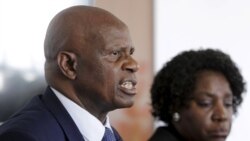Zimbabwe has embarked on a public outreach program in an effort to tackle high poverty levels. Latest statistics indicate that over 60 percent of the country's population is regarded as living far below the poverty datum line.
The Ministry of Finance and Economic Planning has just completed a poverty alleviation public meeting in Harare designed to solicit public strategies of tackling high poverty levels in the country.
Similar meetings to be attended by representatives of nongovernmental organizations, state officials and members of the public, are set to be held in other parts of the country, starting with Gweru next week.
The ministry is expected to come out with a position paper on poverty reduction after completing the public outreach program.
This comes at a time when the Zimbabwe National Statistics Agency says almost 63 percent of the country's 14 million people are poor.
Chief Zimstats statistician, Arnold Damba, who attended the three-day stakeholders consultation meeting in Harare which ended yesterday, said these public outreach meetings will play a key role in addressing the high poverty rates in Zimbabwe.
“The government seeks to ascertain the extent of poverty and get input from stakeholders on measures to mitigate its effect.”
Keith Charumbira, who is a member of Zimbabwe Coalition on Debt and Development, said this is an intervention that needs time and more publicity.
Charumbira said apart from that, it is not likely to achieve much without looking at the Zimbabwe's huge external debt.
Zimbabwe owes multilateral institutions billions of dollars as the country has over the years struggled to repay loans obtained from the International Monetary Fund, World Bank, Paris Club, African Export and Import Bank and several others.
One of the finance directors in the Ministry of Finance, Eria Hamandishe, said the first meeting was well-attended.
Hamandishe said they are expected to capture as many views as possible and incorporate them in order to find ways of curbing poverty in Zimbabwe.
A senior official in the Ministry of Environment, Water and Climate, Kundishora Mupandaguta, told the Harare stakeholders meeting that poverty is having a negative effect on the environment.
He said the country is losing between 100,000 to 320,000 hectares of prime forests annually due to people that are clearing the land in an attempt to eke out a living.
He said his ministry is encouraging local people to engage in fish farming, bee-keeping and the better use of proceeds from selling wild animals in order to fight poverty.






